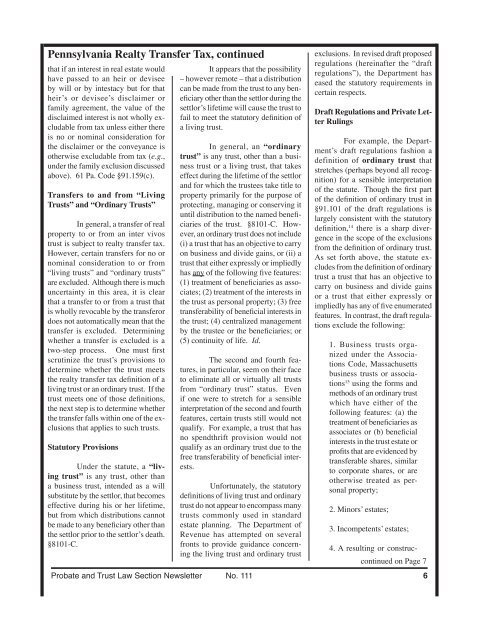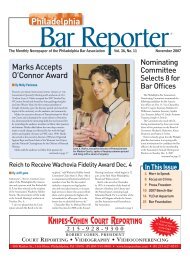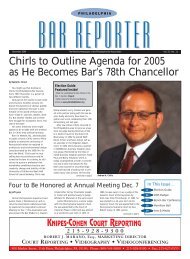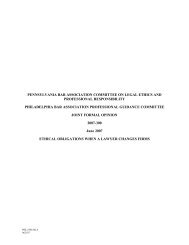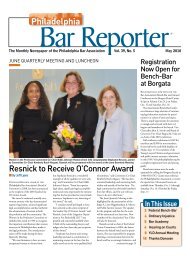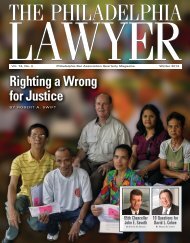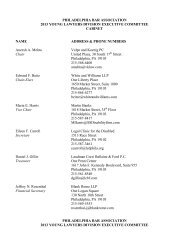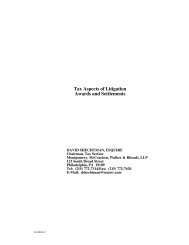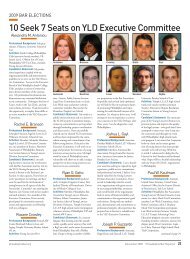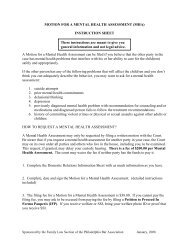Probate & Trust Newsletter: April 2005 - Philadelphia Bar Association
Probate & Trust Newsletter: April 2005 - Philadelphia Bar Association
Probate & Trust Newsletter: April 2005 - Philadelphia Bar Association
You also want an ePaper? Increase the reach of your titles
YUMPU automatically turns print PDFs into web optimized ePapers that Google loves.
Pennsylvania Realty Transfer Tax, continued<br />
that if an interest in real estate would<br />
have passed to an heir or devisee<br />
by will or by intestacy but for that<br />
heirʼs or deviseeʼs disclaimer or<br />
family agreement, the value of the<br />
disclaimed interest is not wholly excludable<br />
from tax unless either there<br />
is no or nominal consideration for<br />
the disclaimer or the conveyance is<br />
otherwise excludable from tax (e.g.,<br />
under the family exclusion discussed<br />
above). 61 Pa. Code §91.159(c).<br />
Transfers to and from “Living<br />
<strong>Trust</strong>s” and “Ordinary <strong>Trust</strong>s”<br />
In general, a transfer of real<br />
property to or from an inter vivos<br />
trust is subject to realty transfer tax.<br />
However, certain transfers for no or<br />
nominal consideration to or from<br />
“living trusts” and “ordinary trusts”<br />
are excluded. Although there is much<br />
uncertainty in this area, it is clear<br />
that a transfer to or from a trust that<br />
is wholly revocable by the transferor<br />
does not automatically mean that the<br />
transfer is excluded. Determining<br />
whether a transfer is excluded is a<br />
two-step process. One must first<br />
scrutinize the trustʼs provisions to<br />
determine whether the trust meets<br />
the realty transfer tax definition of a<br />
living trust or an ordinary trust. If the<br />
trust meets one of those definitions,<br />
the next step is to determine whether<br />
the transfer falls within one of the exclusions<br />
that applies to such trusts.<br />
Statutory Provisions<br />
Under the statute, a “living<br />
trust” is any trust, other than<br />
a business trust, intended as a will<br />
substitute by the settlor, that becomes<br />
effective during his or her lifetime,<br />
but from which distributions cannot<br />
be made to any beneficiary other than<br />
the settlor prior to the settlorʼs death.<br />
§8101-C.<br />
It appears that the possibility<br />
– however remote – that a distribution<br />
can be made from the trust to any beneficiary<br />
other than the settlor during the<br />
settlorʼs lifetime will cause the trust to<br />
fail to meet the statutory definition of<br />
a living trust.<br />
In general, an “ordinary<br />
trust” is any trust, other than a business<br />
trust or a living trust, that takes<br />
effect during the lifetime of the settlor<br />
and for which the trustees take title to<br />
property primarily for the purpose of<br />
protecting, managing or conserving it<br />
until distribution to the named beneficiaries<br />
of the trust. §8101-C. However,<br />
an ordinary trust does not include<br />
(i) a trust that has an objective to carry<br />
on business and divide gains, or (ii) a<br />
trust that either expressly or impliedly<br />
has any of the following five features:<br />
(1) treatment of beneficiaries as associates;<br />
(2) treatment of the interests in<br />
the trust as personal property; (3) free<br />
transferability of beneficial interests in<br />
the trust; (4) centralized management<br />
by the trustee or the beneficiaries; or<br />
(5) continuity of life. Id.<br />
The second and fourth features,<br />
in particular, seem on their face<br />
to eliminate all or virtually all trusts<br />
from “ordinary trust” status. Even<br />
if one were to stretch for a sensible<br />
interpretation of the second and fourth<br />
features, certain trusts still would not<br />
qualify. For example, a trust that has<br />
no spendthrift provision would not<br />
qualify as an ordinary trust due to the<br />
free transferability of beneficial interests.<br />
Unfortunately, the statutory<br />
definitions of living trust and ordinary<br />
trust do not appear to encompass many<br />
trusts commonly used in standard<br />
estate planning. The Department of<br />
Revenue has attempted on several<br />
fronts to provide guidance concerning<br />
the living trust and ordinary trust<br />
exclusions. In revised draft proposed<br />
regulations (hereinafter the “draft<br />
regulations”), the Department has<br />
eased the statutory requirements in<br />
certain respects.<br />
Draft Regulations and Private Letter<br />
Rulings<br />
For example, the Departmentʼs<br />
draft regulations fashion a<br />
definition of ordinary trust that<br />
stretches (perhaps beyond all recognition)<br />
for a sensible interpretation<br />
of the statute. Though the first part<br />
of the definition of ordinary trust in<br />
§91.101 of the draft regulations is<br />
largely consistent with the statutory<br />
definition, 14 there is a sharp divergence<br />
in the scope of the exclusions<br />
from the definition of ordinary trust.<br />
As set forth above, the statute excludes<br />
from the definition of ordinary<br />
trust a trust that has an objective to<br />
carry on business and divide gains<br />
or a trust that either expressly or<br />
impliedly has any of five enumerated<br />
features. In contrast, the draft regulations<br />
exclude the following:<br />
1. Business trusts organized<br />
under the <strong>Association</strong>s<br />
Code, Massachusetts<br />
business trusts or associations<br />
15 using the forms and<br />
methods of an ordinary trust<br />
which have either of the<br />
following features: (a) the<br />
treatment of beneficiaries as<br />
associates or (b) beneficial<br />
interests in the trust estate or<br />
profits that are evidenced by<br />
transferable shares, similar<br />
to corporate shares, or are<br />
otherwise treated as personal<br />
property;<br />
2. Minorsʼ estates;<br />
3. Incompetentsʼ estates;<br />
4. A resulting or construccontinued<br />
on Page 7<br />
<strong>Probate</strong> and <strong>Trust</strong> Law Section <strong>Newsletter</strong> No. 111 6


